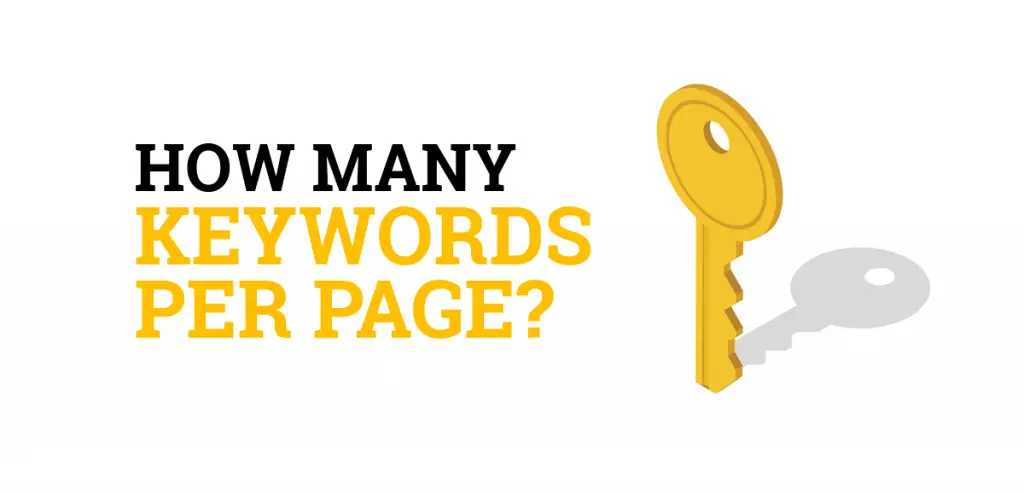The question about “how many keywords per page you should focus on?” keeps popping up, so I decided to write a blog post to answer it.
And if you’re wondering things like:
How many SEO keywords per page should you target? Should you stick to a certain keyword density? Or do you need to create new pages for every single version of a keyword?
Then this post is for you.
When deciding on how many SEO keywords per page to target, there are some standard rules you should follow to get higher rankings. All of which I’ll share with you below.

How Many Keywords Per Page for SEO?
You should focus on three to four keywords per page for SEO. Pick one primary keyword per page while also including two or three secondary keyword variations so the web page is optimized for the most important SEO keywords.
That’s the basic answer for how many keywords per page you should focus on. But there are some additional things you should take into consideration to get the highest rankings. Next, you’ll find the most common questions that relate to how many keywords a page can rank for, how many SEO keywords per page you should target by page type, and if you can ever focus on too many keywords for search engine optimization.
How Many Keywords Can a Page Rank for?
A single page can rank for hundreds of keywords, if not thousands of queries. The number of keywords a page ranks for depends on how well-optimized it is for SEO as well as the total search volume for the related queries.
Ahrefs performed a keyword ranking study on this exact topic and reported, “It looks like the average #1 ranking page will also rank in the top 10 [search results] for nearly 1,000 other relevant keywords (while the median value is more than two times smaller — around 400 keywords). And the lower ranking pages tend to rank for less keywords.”
The reason this occurs is because a single page can rank for hundreds to thousands of related keywords, which are called “long-tail” keywords.
Long-tail keywords are essentially longer forms of the root keyword. For example, a page that ranks for “best SEO keyword tool” may also rank for “best SEO keyword tool for bloggers” or “best SEO keyword tool for small businesses”, etc. It all just depends on how the content was written and how optimized the page is for other relevant keywords.
See my post on the benefits of using long-tail keywords to learn why it’s good to incorporate these phrases into your SEO strategy. You can also learn how to check keyword position in Google here. I wrote an entire guide on the process.
How Many Keywords Should You Focus On?
You should focus on two to three keywords for each page as a bare minimum. This includes one main keyword and two closely related queries. If you can focus on more keywords while making the content sound natural, then try to optimize for more SEO keyword variations.
Now, the answer for how many keywords should you focus on per page will depend on the length of the content.
For example, a 500-word blog post can easily be optimized for two or three keywords, but trying to fit five or six keywords into a short article like that will likely sound unnatural. However, focusing on five or six keywords in a 2,000-word blog post is a common practice and you can spread out the usage of those phrases so the content sounds natural.
Just remember that the more keywords you can focus on, the more chances your pages have to rank in the search engines. Shane Barker, for example, was able to rank his site for 3,461 keywords on the first page of Google by using two to three related keywords on each page.
That’s why keyword research is important for SEO and why I wrote a specific blog post about the topic. I also wrote a complete guide on how to add keywords to a website for SEO purposes if you need help understanding the best places to optimize your content for on-page SEO with your target keywords.
Should I Use the Same Keywords On Every Page?
You should not use the same keywords on every page. Every page should target its own set of keywords to clearly define the topic and to avoid keyword cannibalization issues.
If you use the same keywords on more than one page, then those pages will compete with each other in the search engine results pages (SERPs), which can reduce the rankings for all affected pages. Therefore, it’s best to never repeat a keyword in large quantities on another page.
As Yoast describes it, “If you optimize posts or articles for similar search queries, they’re eating away at each other’s chances to rank.” Yoast goes on to say, “In that case, Google can’t distinguish which article should rank highest for a certain query.”
An easy way to prevent keyword cannibalization is to keep track of which keywords you’re targeting on each page of your site. I do this in a simple Excel spreadsheet. I list the URL in column A and the associated keywords in column B. That way, I know which keywords I’ve already focused on so that I don’t write another article on the same topic or use those keywords in other blog posts.
How Many Keywords Should Be On a Homepage?
There should be three to four keywords on a homepage at a bare minimum to get the most SEO benefit. The homepage is like any other page on your site and should be treated the same way for SEO keyword purposes by including several closely related keywords.
The easiest way to add more keywords to your homepage is to write longer content. Many people treat their homepage as a visual selling piece and don’t include many words on the page. While this may look good from a design standpoint, it can harm your SEO and keyword rankings for the homepage because search engine can’t find many words to associate the content with.
Therefore, increase the number of words on your homepage as a way to improve the SEO keyword rankings and generate more traffic.
Can You Have Too Many Keywords?
It is possible to have too many keywords on one page. First, repeating too many keywords over and over again is referred to as “keyword stuffing” which can penalize your content. And second, jamming as many keywords as possible into a single post can make it unreadable.
Google doesn’t like keyword stuffing and refers to this practice as an “attempt to manipulate a site’s ranking in Google search results.” Repeating the same words or phrases so often that it sounds unnatural, for example:
We sell custom cigar humidors. Our custom cigar humidors are handmade. If you’re thinking of buying a custom cigar humidor, please contact our custom cigar humidor specialists at custom.cigar.humidors@example.com.
If Google detects keyword stuffing on a page, it can penalize that content and cause it to drop in rankings or never rank high at all. So stay away from that failed strategy.
What Is the Ideal Keyword Density?
The ideal keyword density is around 1-2% for every 100 words of text as explained in this guide on what is a good keyword density to aim for with on-page SEO while avoiding keyword stuffing.
Generally, the longer the SEO word count, the lower the keyword density should be. You want the keyword to appear enough times for good SEO without it becoming too repetitive and sending a negative signal to the search engine algorithms that keyword manipulation is taking place.
But keep in mind that search engines like Google don’t have a hard-and-fast rule for keyword density. Every page and keyword is different, and therefore, will require a different set of standards for keyword density. Even Page One Power SEO agency considers keyword density to be “the worst metric for SEO ever“. For example, the single word “keyword” appears more than 100 times on this page, and that’s not considered keyword stuffing, given the topic of the content.
The best advice here is to just write naturally and use the keyword as many times as necessary to get the point across throughout the page.
You can count the keyword density for the top-ranking pages in Google for your target keyword to get a good idea of the density you should aim for. You can also reference the keyword density for your own top-ranking content for similar topics to get a good starting point. Or just use one of these keyword density checker tools.
Now with all that being said, you still want to put your keywords in the right spots on the page in order to send the correct signals to Google that your content should be ranked for them. This strategy is called keyword prominence.
Summary for How Many Keywords Per Page for SEO
I hope you enjoyed this article answering the question about how many keywords per page for SEO you should focus on.
As you discovered, the answer for how many keywords should you target will depend on the length of that content. However, it’s best to focus on at least two to three keywords for every page. If you have a longer piece of content, then the answer for how many SEO keywords per page can be five or six or more. As long as you keep the content reading natural, you should be fine.


SEO Chatter is dedicated to teaching the fundamentals of search engine marketing to help marketers understand how to increase organic website traffic and improve search engine rankings.
